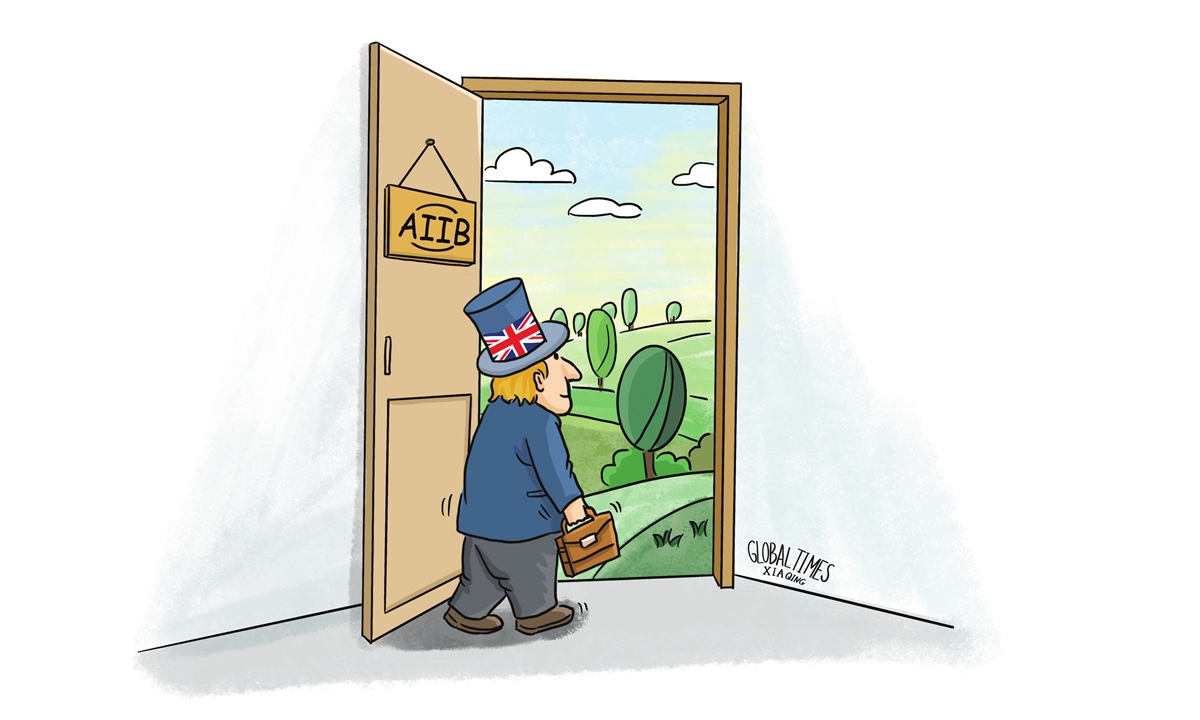
Illustration: Xia Qing/Global Times
Danny Alexander, a former chief secretary to the UK Treasury and currently a vice president for policy and strategy at the Asian Infrastructure Investment Bank (AIIB), sparked a new wave of criticism of the UK's membership at the multilateral lender, when he reportedly talked about how the bank paved a way for "Europe and China to cooperate, by investing in building projects globally," and offered a "message of hope."
The UK newspaper the Telegraph immediately jumped on the story and claimed in an article on Sunday that "British backing for China's global ambitions raises the alarm." The article described the AIIB as a "Chinese rival to the World Bank" and asserted that the UK's backing of the bank "faces fresh criticism as it faces claims of Chinese colonialism."
Those are rather harsh words about a multilateral bank focusing on infrastructure projects in developing countries. But such claims are, at best, pure sensationalism, and, at worst, ill attempt to undermine global cooperation. China proposed the creation of the AIIB, but the bank has over 100 members, including the UK, Germany and Canada. No fair-minded person would view the AIIB as a project just for China to pursue its "global ambitions," unless he or she is blinded by ideology.
Against the backdrop of the rapid growth of emerging economies, China proposed establishing the multilateral bank with a major focus on financing infrastructure projects across Asia, filling a vital gap in infrastructure financing in the region. The idea drew support from many countries, including the UK, because it was a huge opportunity. For the UK, which has an economy pillared by finance, joining the AIIB will help the traditional finance powerhouse to maintain its advantages, especially in a post-Brexit era.
The criticism of the UK's membership at the AIIB is also fueled by the US. Washington did not hide its discontent over London's choice in the first place, with US officials claiming that they were "wary about a trend toward constant accommodation of China, which is not the best way to engage a rising power," according to the Financial Times.
It's safe to say that the UK did not chose to join the AIIB to "accommodate" China or back China's "ambitions;" instead, it knew clearly that it was a great opportunity to participate in the crucial phase of economic development of the emerging economies in Asia, which is set to generate huge momentum for future economic growth in the century.
London seized the opportunity in March 2015, and submitted the application to join the AIIB before it officially opened for business in 2016. Besides the UK, Germany, Netherlands, Spain, Austria, South Korea, Australia and New Zealand are all founding members of the bank.
Despite a major focus on Asia, the multilateral bank does not limit its development within the continent. As of October 2021, the AIIB had approved 147 projects with an accumulated investment worth over $28.97 billion, benefiting 31 regional and non-regional members. It had also registered 104 approved members, with 11 from Africa.
The bank has been holding an open door for both developed and developing economies across the world. Some noises from the West questioning any membership or any project funded by the bank won't hold back the bank's mission or momentum.
In fact, with China serving as the major driver for global economic growth and the center of international economy tilting toward Asia, it is predictable and reasonable for a change to the global financial system previously dominated by the US to make it fairer and more beneficial for developing economies.
Rather than being fearful of losing a long held hegemony or anxiety over weakening confidence, Western countries like the UK should step up their participation in the AIIB and other multilateral efforts aimed at boosting developing economies, or they will be left out entirely.
The author is an editor with the Global Times. bizopinion@globaltimes.com.cn




